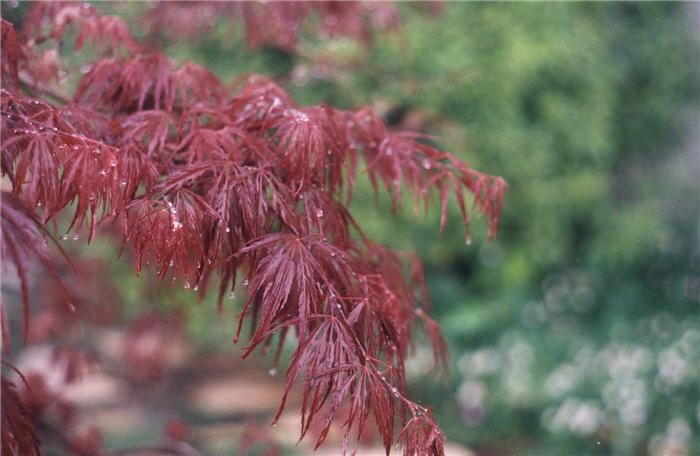| Botanical Name: Acer palmatum 'Crimson Queen' | |
| Common Name: Crimson Queen Japanese Maple |

-
Anatomy
-
Culture
-
Design
Plant Type
Tree
Height Range
6-12'
Flower Color
n/a
Flower Season
n/a
Leaf Color
Bronze, Purple
Bark Color
Brown
Fruit Color
n/a
Fruit Season
n/a
Sun
Half, Shade
Water
High, Extra in Summer
Growth Rate
Slow
Soil Type
Clay, Loam
Soil Condition
Average, Rich, Well-drained
Soil pH
Acid, Neutral
Adverse Factors
n/a
Design Styles
Formal, Japanese, Water Garden, Woodland
Accenting Features
Fall Color, Silhouette, Specimen, Unusual Foliage, Unusual Shape
Seasonal Interest
Winter, Spring, Summer, Fall
Location Uses
Entry, Shrub Border, Foundation, Patio, Raised Planter
Special Uses
Small Spaces
Attracts Wildlife
n/a
Information by: Stephanie Duer
Photographer: Norman's Nursery
Photographer: Norman's Nursery
-
Description
-
Notes
This Japanese maple has an arching, mounded habit, eventually growing 10 feet tall and wide, though slowly. Leaves emerge in spring a deep crimson, and are dissected and lacy. Summer foliage is bronze-red; fall color is red.
As will all Japanese Maples, provide deep, rich, well composted soil. If you are amending the soil, it is best to dig in compost to the plant's eventual width, so as to provide adequate conditions for the entire, eventual root profile. Amending just the hole that the tree is planted in is akin to planting the tree in a slightly bigger pot. Plant in filtered light to full shade, avoiding any mid-day sun or reflective sun. East or north exposures are best unless thre is a very good canopy and no reflective heat. Water weekly. Do not shear.